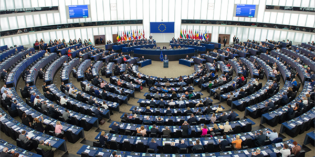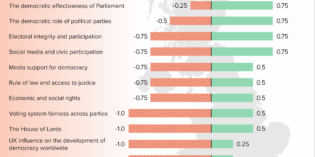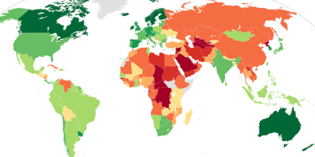
Why do we care what our politicians get paid?
Since payments for MPs were introduced in the early 20th century, the rhetoric used to justify them has changed markedly. Initially, writes Nicholas Dickinson, any remuneration was almost always construed in terms of broadening democratic representation. Related to a landmark 1971 report, however, MPs increasingly began to be depicted as political professionals. This change in framing allowed salaries to increase, but at the cost of lasting public ambivalence.

The realignment of European voters and parties over cultural values is transforming political competition
Over the past 40 years, both citizen and party elite opinions on economic and cultural issues have shifted, with increasing cultural cleavages gaining particular significance. Russell J Dalton demonstrates how these changes are transforming current European party competition and electoral dynamics.

How transparent and free from corruption is UK government?
For citizens to get involved in governing themselves and participating in politics, they must be able to find out easily what government agencies and other public bodies are doing. Citizens, NGOs and firms also need to be sure that laws and regulations are being applied impartially and without corruption.In an article from our book, The UK’s Changing Democracy: The 2018 Democratic Audit, Ben Worthy and the Democratic Audit team consider how well the UK government performs on transparency and openness, and how effectively anti-corruption policies operate in government and business.

The UK is heading towards a constitutional crisis over Brexit
As the clock runs down on Article 50, a political crisis is looking increasingly likely. However, Iain Begg argues that this could become a more damaging constitutional crisis if Parliament is unable to settle how Brexit proceeds.

Losing the ‘Europeanisation’ meta-narrative for modernising British democracy
Contrary to claims of Britain’s enduring political and constitutional distinctiveness, in the period from 1997 to 2016 the UK in fact modernised its polity by following several strong ‘Europeanisation’ trends. British democracy came to increasingly resemble other European liberal democracies in some fundamental ways. Yet now this meta-narrative may be lost following Brexit. Patrick Dunleavy explores some implications of the UK’s possible lapse back into rudderless idiosyncrasy.

Book Review | Making a 21st Century Constitution: Playing Fair in Modern Democracies by Frank Vibert
In Making a 21st Century Constitution: Playing Fair in Modern Democracies, Frank Vibert explores the current state of constitutions, outlining why they have become outdated and suggesting ways in which they can be reworked to better meet the needs of democracies today. While readers may not agree with all of the book’s arguments, it provides interesting insight into how constitutions can overcome their democratic weaknesses and is a welcome addition to this increasing body of scholarship, finds Elyse Wakelin.

Micro-institutions in liberal democracies: what they are and why they matter
Liberal democracies combine core ‘macro-institutions’ (like free elections and control by legislatures) with swarms of supportive ‘micro-institutions’. By contrast, semi-democracies keep only the façade of macro-institutions, subverting a range of critical micro-institutions so as to make political competition and popular control a hollow sham. Drawing on a new book, Patrick Dunleavy explains why these developments mean that political science has to get a lot more granular and sophisticated, instead of focusing just on ‘toy models’.

Auditing the UK’s democracy in 2018: Core UK governance institutions show sharply declining efficacy
Today we are publishing The UK’s Changing Democracy: The 2018 Democratic Audit, a systematic assessment of the country’s democratic institutions, large and small. Previous audits of the UK’s democracy, including the most recent in 2012, have generally found that, overall, the quality of our democratic institutions have improved over the past twenty years. However, Patrick Dunleavy and Alice Park find that this year’s Audit shows unprecedented declines in the core institutions of the UK’s democratic system, particularly at the centre.

In comparative league tables of liberal democracies the UK’s democracy is judged to be First Division, but not Premier League
Ranking established liberal democracies against countries that are still developing a democratic polity risks awarding the long-lived countries ‘ceiling’ scores at the top of the table – feeding complacency amongst their elites and domestic publics that they can now rest easy on their laurels. However quantitative rankings typically do not treat the UK in this manner. Instead they assign it to a ‘good but not great’ category, well behind the states leading democratic good practice. For our new book, The UK’s Changing Democracy: The 2018 Democratic Audit, Patrick Dunleavy explores why.





 Democratic Audit's core funding is provided by the Joseph Rowntree Charitable Trust. Additional funding is provided by the London School of Economics.
Democratic Audit's core funding is provided by the Joseph Rowntree Charitable Trust. Additional funding is provided by the London School of Economics.